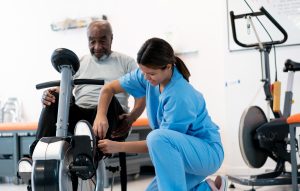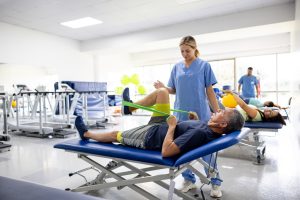PTA School: Physical Therapist Assistant Educational Program
Published - May 31, 2024

What Do You Learn During PTA School?
As a PTA student, you will complete courses in general education, anatomy and physiology, medical terminology, introduction to psychology, functional anatomy, PTA fundamentals, physical rehabilitation, PTA Lab, kinesiology, pathophysiology, therapeutic exercise, physical interventions, clinical integration, and a preparation course for the NPTE exam and licensure.
Anatomy and Physiology
This course teaches PTA program students about human anatomy, including body systems, organs, tissues, and cells. Topics include the nature of science, human genetics, and development.
Medical Terminology
A review of suffixes, prefixes, and roots to memorize medical terminology. This includes basic word structure, anatomical terms, body structure, medical diagnoses, and procedures.
Introduction to Psychology
An introduction to general psychology, including human behavior, mental processes, and the development of personality.
Functional Anatomy
A review of the relationship between the musculoskeletal and neuromuscular systems and understanding how these systems work for efficient movement.
PTA Fundamentals
A review allowing school instructors to teach physical therapy history and professional development regarding the role of the personal therapy assistant. It also introduces the American Physical Therapy Association (APTA) concepts.
Physical Rehabilitation
This is a series of courses introducing patient care procedures, the use and application of personal protective equipment, body mechanics, Basic Life Support, OSHA practices, and HIPAA standards.
PTA Lab
A series of lab courses that allows the school instructor to instruct, demonstrate, and empower students to practice data collection and patient care procedures.
Kinesiology
A review of human movement science and the biomechanical forces at play.
Pathophysiology
A review of the musculoskeletal, genitourinary, and gastrointestinal systems affecting the body structure and function throughout a human lifespan.
Therapeutic Exercise
A series of courses supervised by the school instructor that offers therapeutic exercises across the stages of tissue healing.
Physical Interventions
A review of the application of physical and mechanical agents for intervention of musculoskeletal system impairment.
Physical Therapist Assistant Practice
A series of courses that focus on safe, ethical, legal, and value-based behavior for PTA students.

A series of courses where students apply selected skills, knowledge, and behavior under the strict supervision of school instructors and licensed physical therapists.
NPTE Exam and Licensure Preparation
A review of the National Physical Therapy Exam (NPTE) and licensure for graduation and employment as a physical therapist assistant in California.
PTA School Program
You’re already making a difference through the work you love. Now, take it to the next level with the Physical Therapist Assistant program from CBD College. It’s flexible, affordable, and uniquely tailored to build on the skills and experience you’ve acquired professionally.
Contact us now to learn more.



